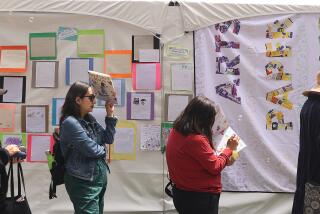Linda Gregg, award-winning poet who explored love and loss, dies at 76
Linda Gregg, an award-winning poet whose muse followed her in her wanderings from the wilds of Northern California to the rugged hills of Greece, from the Texas desert to a New York homeless shelter, in love and in the absence of it, died March 20 at a hospital in Manhattan. She was 76.
The cause was cancer, said poet Timothy Liu, a longtime friend.
Gregg was nearly 40 when her first book of poetry, “Too Bright to See,” was published in 1981. She followed it with half a dozen more volumes, attracting praise from poets as distinguished as the late W.S. Merwin, who lauded her poems as “original in the way that really matters.”
“They speak clearly of their source,” Merwin observed in comments published by the Poetry Foundation. “They are inseparable from the surprising, unrolling, eventful, pure current of their language, and they convey at once the pain of individual loss, a steady and utterly personal radiance.”
Yet as late as a decade ago, Gregg had yet to receive the attention that some readers considered her due. In 2009, the organization Poets & Writers awarded her the Jackson Poetry Prize, then worth $50,000, honoring “an American poet of exceptional talent who deserves wider recognition.”
Gregg grew up in Marin County and throughout her life would look to her surroundings for inspiration.
She found it in the desert outside Marfa, Texas, where she once purchased a fixer-upper for $800, Liu wrote in a tribute published on the website Literary Hub. She found it in Greece, where she lived in the 1960s with the poet Jack Gilbert during what was described as their unofficial marriage. In Greece, her comforts were limited to three oil lamps and a mattress, according to a profile published in the Indianapolis weekly Nuvo.
“I have seen raw cypresses / so dark the mind comes to them without color,” she wrote in the poem “The Poet Goes About Her Business,” published in “Too Bright to See.”
Dark on the Greek hillside. Dark, volcanic, dry and stone.
Where the oldest women of the world are standing dressed in black
up in the branches of fig trees in the gorge
knocking with as much quickness as their weakness will allow.
Weakness which my heart must not confuse with tenderness.
Gregg found images of similar pathos in urban environments. In the poem “Lies and Longing,” she described a scene in a women’s homeless shelter like one she might have encountered earlier in life, when she lived briefly on the streets in New York while struggling to support herself and her writing:
Half the women are asleep on the floor
on pieces of cardboard. . . .
An old woman sings an Italian song in English
and says she wants her name in lights:
Faye Runaway. . . .
One keeps talking about how fat she is
so nobody will know she’s pregnant.
Liu described Gregg’s style as “measured and austere,” giving her lines “a feeling of chiseled marble.” Yet her themes were “deeply felt,” he continued, imbuing her work with an arresting combination of “classical restraint and then a more Romantic exuberance.”
For all her fascination with the world around her, Gregg looked inward to find some of her most potent lines.
She wrote in the poem “Wrapping Stones”:
Everything I am is what survived
love’s leaving. Everything I see, eat, want,
have is what survived the goneness
of what love is. Love, like time, takes down
the house, leaving only the partial walls,
open squares of light for windows,
and a door.
Linda Alouise Gregg was born in Suffern, N.Y., on Sept. 9, 1942, one of four girls whose father was an architect and arts educator mother was a teacher, Liu said. When Gregg was young, the family moved west.
“I am made of the landscape in northern California where I grew up,” she wrote in her essay, recalling a mountain where she and her twin communed with “the live oak trees, the stillness, the tall grass, the dry smell of the hot summer air where the red-tailed hawks turned slowly up high, where the two of us alone at ten did the spring roundup of my father’s twenty-six winter-shaggy horses.”
Gregg graduated in 1967 from what is now San Francisco State University, where she also received a master’s degree in English in 1972. Her professors there included Gilbert; they were a couple from 1962 to 1970 and remained friends until his death in 2012. Gregg’s subsequent marriage to John Brentlinger ended in divorce, and her survivors include her three sisters.
In later decades, Gregg found financial security by living frugally on teaching salaries, Liu said. She taught at prestigious institutions including the Iowa Writers’ Workshop, Princeton University and Columbia University, and received awards including a Guggenheim Fellowship and several Pushcart Prizes.
Her collections of poetry included “Eight Poems” (1982), “Alma” (1985), “Sacraments of Desire” (1991), “Chosen by the Lion” (1994), “Things and Flesh” (1999), “In the Middle Distance” (2006) and “All of It Singing” (2008).
“Certainly one can make good poems without feeling much or discovering anything new,” she wrote. “You can produce fine poems without believing anything, but it corrodes the spirit and eventually rots the seed-corn of the heart. Writing becomes manufacturing instead of giving birth.”
Langer writes for the Washington Post.
More to Read
Start your day right
Sign up for Essential California for the L.A. Times biggest news, features and recommendations in your inbox six days a week.
You may occasionally receive promotional content from the Los Angeles Times.






